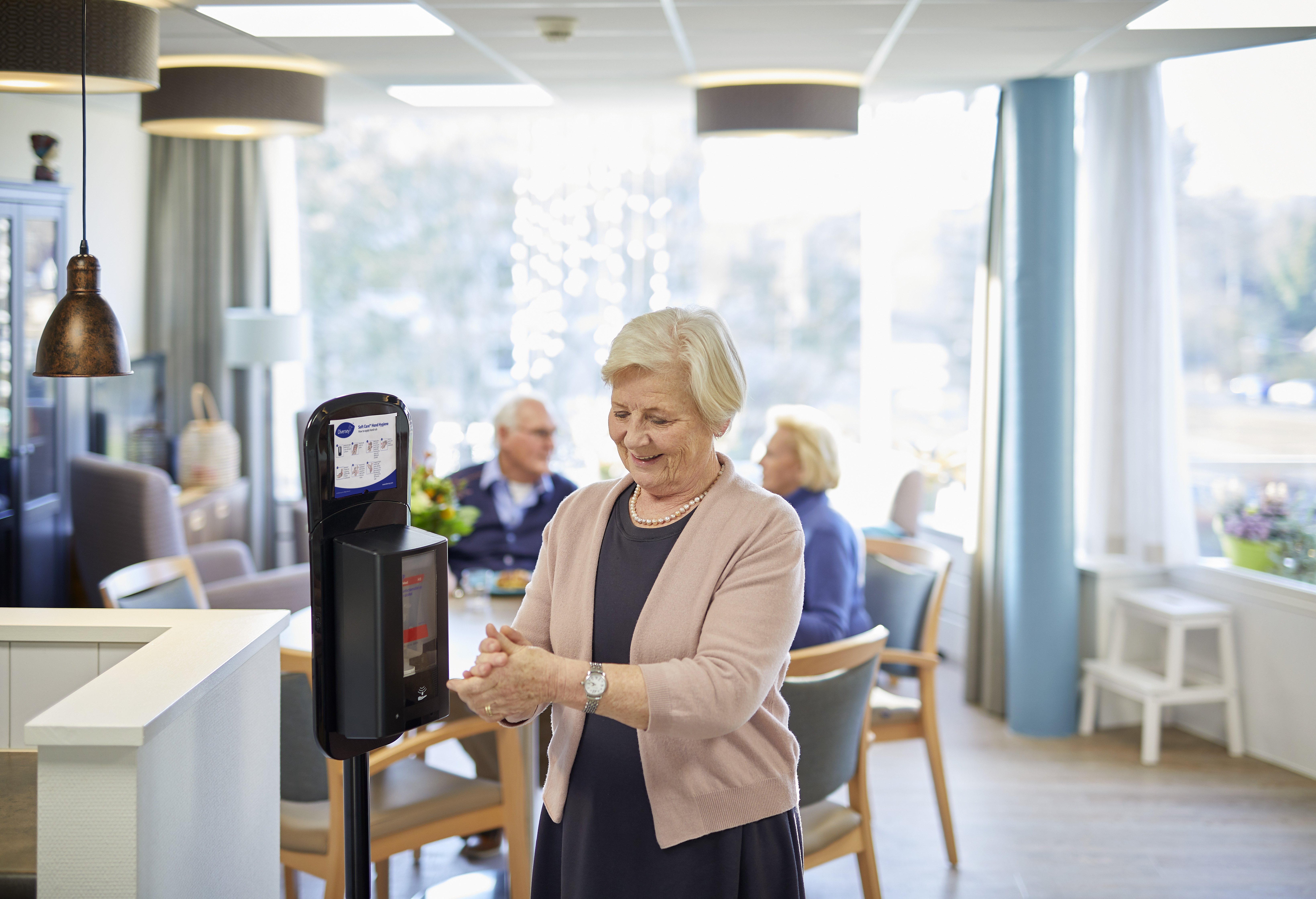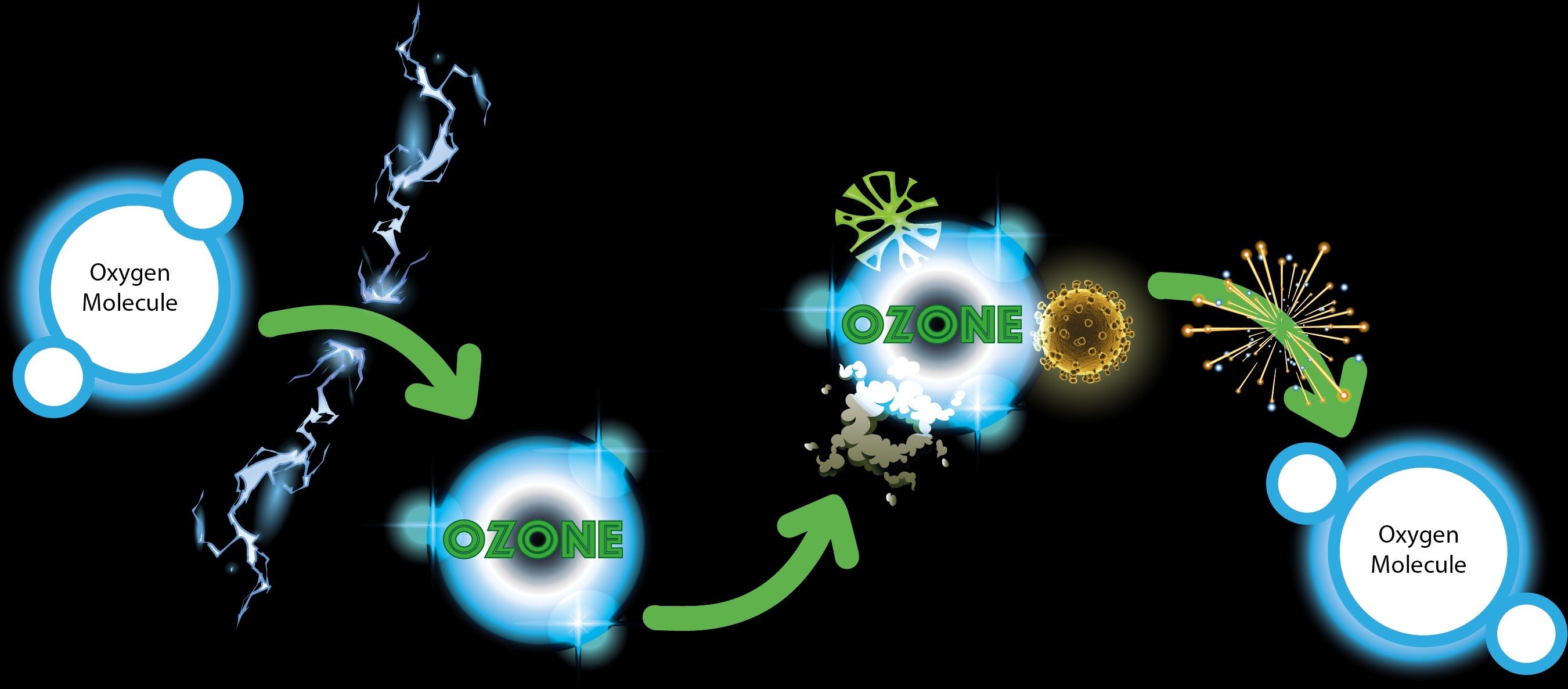Configuring Effective Infection Prevention Regimes

Protecting residents, staff, and visitors from infections is a core requirement in care homes. The range of products available, and the different ways they can be used, means that housekeeping teams have more choice than ever before. It is therefore essential to work with a supplier who can identify priorities, optimise processes, and choose the right combination of products.
With any infection prevention regime, it is useful to identify the critical pathogens of concern. Studies conducted before the Covid-19 pandemic suggested influenza, norovirus, salmonella, and streptococcus pyogenes accounted for over half of infections (Ref1) in care homes. Similar studies conducted today would probably add SARS-Cov-2, the virus that causes Covid-19, to this list.
Common viruses and bacteria like these often spread by direct contact, touching contaminated surfaces, and through breathing in airborne droplets produced when infected people cough, sneeze, or breathe. Any effective infection prevention regime must therefore incorporate good personal hygiene and surface disinfection as well as activities such as distancing and mask wearing not directly related to cleaning and hygiene.
Meeting the standards expected by the CQC is important and this increasingly means recording metrics to audit cleaning and hygiene performance. ATP testing can be useful when assessing general levels of cleanliness: before-and-after results of swabs from frequent-touch and high-risk surfaces can show performance improvement.
ATP testing can be augmented with cleaning verification systems. These use portable devices or smartphones and web-enabled applications to systematically record in real time a much wider range of metrics. This can include when critical tasks – such as disinfecting frequent touch-points - were completed and by whom. Supervisors always have an up-to-date overview of infection prevention processes which can be used for CQC compliance reporting. They can also identify trends that help them take evidence-based decisions to eliminate non-compliance or systematic inconsistencies and improve outcomes.
Whatever disinfectant is chosen it must be effective. Suppliers should have evidence their products meet relevant EN-numbered disinfection standards. Products meeting EN14476, for example, will be effective against viruses such as the one that causes Covid-19. Wightman & Parrish would recommend an item such as the Oxivir Excel Cleaner Disinfectant. Other important EN tests cover bacteria, yeasts, and fungi, and some products will meet multiple standards.
Many sites continue to use conventional chlorine-based products, following decades of perceived wisdom and established practice. Such products have been widely used during the pandemic when many homes adopted a cautious approach. This is not to say these products are not effective, because they are, but their widespread use is based on Government recommendations for acute care which are not always appropriate in care homes.
Care homes considering a change of surface disinfectants will need support and reassurance. Alternative formulations with innovative active ingredients can offer advantages in terms of sustainability, speed, simplicity, safety, and surface compatibility with similar or better efficacy against pathogens of concern. Products containing actives such as AHP (accelerated hydrogen peroxide) offer broad-spectrum efficacy against a wide range of pathogens but with fewer potential drawbacks than conventional chlorine formulations. The Oxivir Plus Disinfectant is a great option as it is based on innovative Accelerated Hydrogen Peroxide technology that effectively destroys pathogens such as MRSA, Hepatitis
C and Norovirus.
Using chlorine typically involves a two-step process where the surface must be cleaned before disinfectant is applied. Alternative products classified as cleaner disinfectants complete both tasks in a one-step process and can have shorter contact or dwell times. That can reduce cleaning times which in itself can justify the change.
Further savings are available when products are supplied as concentrates with controlled dosing platforms rather than as ready-to-use or bulk formulations. Solutions are prepared in reusable spray bottles, buckets, and cleaning machines by adding water at the point of use. This promotes consistent preparation of solutions with predictable costs and almost no wastage. Wightman & Parrish offer a wide range of Diversey's SmartDose products, available here.
Moving to concentrated products can also enhance sustainability. Adding water at the point of use rather than the point of manufacture generally means less product is required for any given application. This reduces packaging, sourcing, transport and handling, storage, and waste disposal costs. For example, depending on product, one container of concentrate can replace 70 or more ready-to-use spray bottles. Packs that are made wholly or partially from recycled materials and which themselves are recyclable offer additional benefits. Wightman & Parrish can demonstrate these using sustainability calculators.
Conventional disinfection processes rely on removing pathogens from a surface that could be contaminated again right away. A new type of product offers ongoing protection and is especially useful for door handles, light switches, and similar frequent touch surfaces. These products initially disinfect like a conventional formulation but dry to form an almost invisible polymer layer. This retains the disinfectant which can then can then destroy pathogens that are deposited, offering ongoing protection of up to 24 hours. Some sites have reduced cleaning frequency from two-hourly to twice-daily as a result. Feedback from care homes suggests these products could be particularly useful during night-time when there are fewer members of staff present to carry out cleaning tasks. Efficacy is demonstrated by the BSI PAS 2424 Residual Antimicrobial Efficacy or the even more stringent EPA RSS tests.
Hand hygiene is the other critical aspect of infection prevention. It is common in care homes to find pump-top bottles at key locations so that residents and staff can disinfect their hands whenever they want. This is convenient and practical but switching some or all to wall or post-mounted professional dispensers can offer benefits. These can include reduced risk of the dispenser going missing or running out of product, which helps maximise availability and hand hygiene compliance. Professional dispensers can also help reduce wastage and costs by ensuring the right amount of product is always dispensed. Systems with high capacity and interchangeable products can simplify processes and reduce supervisory and supply chain burdens, time, and costs. For example, the Soft Care Dispenser can be used with any of the Soft Care Cartridges, such as the Soft Care Liquid Hand Sanitiser.
As with surface disinfectants, many care homes are hesitant to change their hand hygiene products. One of the main reasons is that residents and staff are familiar with existing products and trust them. On rare occasions, some users can suffer reactions to new formulations. Many of these concerns can be addressed through short-term on-site trials with feedback to finalise decisions. Most suppliers offer a choice of formulations which comply with required EN-numbered infection prevention standards.
Infection prevention is a critical part of care home life. Changing products and processes can be a difficult decision especially when existing protocols are established and trusted. But change can deliver improvement to outcomes and sustainability while saving time and money that can be used instead to enhance care.
If you would like to find out more about how Wightman & parrish can help your Care Home with its Infection Control by using Diversey products, fill out the form below.


